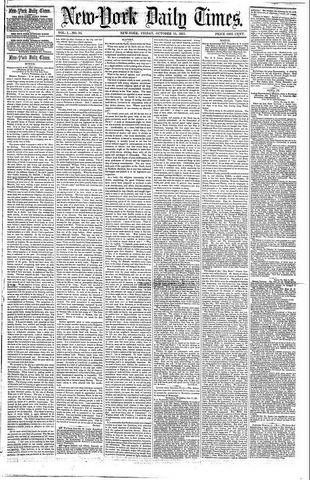
(Slavery
The New York Daily Times
New York, N.Y.: Oct 10, 1851. p. 1)
I will use a few excerpts to illustrate how a debate about Good and Evil goes. (You can save it as an image to take a look at all of it if you want. Some of it is illegible.)
First, you have the intolerant zealots who say what everyone already knows. Good and Evil exist, there is the knowledge of Good and Evil by words. The reply is this: "Did God really say? Is it really so? That might be so. But is it so....necessarily? That sounds absolute, dogmatic! Maybe it is not so, not really. Well, it is not as if everyone agrees. So how can it be so?"
Example,
"Abolitionists, as a class, hold that to have slaves is necessarily doing a sinful thing; that the relation of master and slave is always an atrocity in morals; that every slaveholder, just as the adulterer is bound to renounce his sinful indulgence, is morally bound to set free his slaves without regard to consequences or to the character of slaves; and that every State or community ought on the instant, to make freemen of the slaves, clothing them with all the rights and privileges of citizenship. This has always been the dogma of pure abolitionism, the utter sinfulness of slavery and the imperative duty of prompt emancipation. Not one twentieth part of the population at the North, found in Northern churches, has at any time embraced this dogma and pushed it to its legitimate consequences.
As a body, the religious community of the North, comprising the great Christian sects, have never been prepared or inclined to side with Abolitionists, and affirm that slaveholding is necessarily sinful; the few that have espoused this sentiment in any Church, and sought rigorously to carry it out in practice, and bind it upon the consciences of other men, have been partisans and agents of disorder; have proved themselves the disorganizing spirits of the communions to which they pertained, and as such have sometimes been thrown out and rejected by their respective churches.
……
The behavior of slaveholders, man by man, candid minds will look at, before pronouncing judgment upon their character. Besides, in point of fact, it is abundantly on evidence that slaveholders do manifest the peculiar virtues of the Christian religion, and some of them in a high degree, having, for example, sacrificed many times more in the shape of money and labor than their accusers, to promote the well being of the slave."
Then there is that argument, "Well, I know a nice person who does that. I know someone nice, like me, the nicety of me! Do you know someone nice? Well, if you weren't so narrowminded then you would know how nice all people are. Why are you so judgmental?"
These are the general pattern of the arguments when someone knows they are compromising with or being evil. Shift, then some positive conditioning, slither, then some negative conditioning.....etc. and at all costs, avoid the objective conceptual issue as you engage in emotional conditioning.
That article represents the voice of Northern moderates. It is not obviously depraved or morally degenerate. It just seeks a compromise with evil to go along, to get along. And when a person is doing that, they tend to create a pattern of arguments that is quite ancient.
An interesting parallel,
DOUBLE STANDARDS: THE SUPPRESSION OF ABORTION PROTESTERS' FREE SPEECH RIGHTS
By Christopher P. Keleher
2002 51 DePaul L. Rev. 825
Excerpt:
It was not until the approach of the Civil War that the scope of First Amendment protection again became an issue. During this time, there were widespread efforts by slavery supporters to suppress the free speech of abolitionists. Both in the South and in the North, members of the abolitionist movement were often silenced by the court system, public mobs, and police arrests.
Most of the southern states' legislatures were also involved in the suppression of speech. For example, the Georgia legislature passed an act awarding five thousand dollars to anyone who arrested the editor of the abolitionist newspaper, The Boston Liberator. Further, grand juries in many states also played a role in suppressing abolitionist speech by indicting publishers of abolitionist newspapers,ministers who spoke out against slavery, and anyone else opposed to their point of view.
(The article draws various accurate parallels, so where is the ACLU regarding the supression of speech there? I suppose they are off defending pornographers.)
It's interesting. I have noticed that the first impulse of those who know they are being evil is to censorship. You see, if only people couldn't say/judge it to be so, then it would not be so. If only the Gestapo could arrest all those who disagree and eliminate the "ethical code worship of the Jews"!
1 comment:
Post a Comment